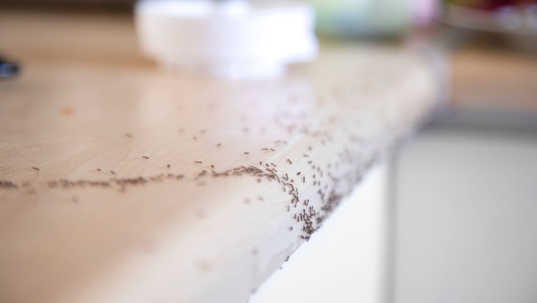Understanding Ant Behavior to Prevent Infestation
Ants are fascinating creatures that operate with military-like precision, often undetectable until it's too late. The key to preventing an ant infestation in your home is understanding how these tiny invaders operate and what draws them indoors. Ants typically enter homes through minuscule entry points such as cracks, gaps, and utility lines — areas easy to overlook in the daily hustle. Recognizing these structural vulnerabilities is your first line of defense. Patrolling your home for these potential gateways can drastically reduce the likelihood of ants making their way inside. By sealing these gaps, you create a significant barrier to their seemingly endless invasions, which often turn nesthunting ants into unwelcome tenants.
The secret to a pest-free home is understanding what makes it so appealing to ants in the first place. Often, they're lured by the prospect of food and the hospitable conditions your home offers — particularly warm, moist environments that are abundant during the summer months. Common attractants include sugary substances and food remnants left out in the open. Implementing mindful practices, such as cleaning up food spills promptly and storing food in airtight containers, can deter these opportunistic pests. Furthermore, being alert to early signs of an infestation, such as ant trails or nests, can help you tackle the problem before it grows into a significant issue requiring professional intervention.
Home Maintenance and Cleanliness
Implementing rigorous home maintenance and cleanliness routines is fundamental to keeping ants at bay. Targeted cleaning techniques are proven to work wonders in dissuading these unwelcome guests. This includes daily practices like wiping down surfaces to eliminate food residue, sealing trash cans, and attending to even minor spills immediately. Maintaining spotless countertops and floors significantly reduces the potential for ants to see your home as a buffet. Increasing the frequency and thoroughness of these routines is especially crucial during peak times, such as summer and early fall when ants are more active.
Beyond cleanliness, decluttering your home serves an equally important role in detrimental ant activity. Clutter offers ants ample hiding and nesting options, making it more challenging to detect their presence or stage preventive measures. By minimizing piles and organizing spaces, you reduce these opportunities. Additionally, conducting periodic home maintenance to block potential entry points is crucial. Inspecting and repairing these vulnerabilities—like sealing cracks and ensuring door sweeps are intact—are effective strategies that work hand-in-hand with cleanliness. Together, these efforts create an environment that is less appealing and accessible to ant colonies.
Natural and Chemical Ant Deterrents
Finding the balance between effective pest control and safety can often be a delicate process; however, natural repellents offer a simple solution. Essentials oils like peppermint and tea tree, along with household items such as vinegar and diatomaceous earth, serve as gentle yet effective deterrents. These natural options can be safely used around children and pets. Spreading a thin layer of diatomaceous earth in problem areas or strategically using essential oils in diffusers can gently shift the balance in your favor. By understanding the correct application methods, these repellents can seamlessly become part of your regular home care routine.
However, when natural methods fall short, chemical solutions provide a more potent line of defense. Using pesticides and baiting systems can effectively halt a progressing infestation. Eco-friendly products are increasingly available, ensuring your home remains safe while effectively targeting pests. It's vital to adhere to safety tips when employing these methods, such as keeping them out of reach of pets and small children, and following the label instructions meticulously. Ultimately, integrating both natural and chemical deterrents in and around your home forms a robust defense against ants—especially when complemented by strategic outdoor landscaping techniques.
Proactive Prevention Strategies
Working to prevent an ant invasion should extend beyond the walls of your home, stretching to your garden and landscaping efforts. This approach reduces their likelihood of even approaching your home. Maintaining cleanliness in your yard is paramount; removing debris and keeping plant growth in check limits the attractive qualities that draw ants. Choosing pest-resistant plants and keeping gardens well-tended reduces nesting spots, thereby deterring ants naturally. With these techniques, your landscape becomes an active participant in your ant prevention strategy.
In addition, incorporating regular home check-ups can proactively block potential invasions. These scheduled inspections allow you to address little issues before they become significant problems, ensuring that your defenses against ants are always reinforced. In tandem with creating an inhospitable indoor environment by managing humidity levels and using airtight food storage, these strategies foster an environment that is unwelcoming to ants. Collectively, these practices ensure that your home and garden remain aligned in their mission to protect against infestations.
When to Call Professional Pest Control
Despite your best efforts, there are times when professional help becomes necessary. Recognizing severe infestations—a sudden influx of ants, persistent trails, or visible nests within your home—should prompt you to call in the experts. Ant colonies can be complex and robust, often spanning unseen spaces within walls and beneath floors, making them challenging for homeowners to eliminate entirely. In such situations, DIY measures simply might not suffice to prevent re-infestation.
Ultimate Pest Control Is Your First Line of Defense Against Ants
When looking for ant control service, it is essential to weigh several factors. Look for experienced companies with proper certifications and a track record of success in ant control. Understanding the nuances of their service offerings can better inform your choice.
With Ultimate Pest Control, you can expect scientifically-backed approaches tailored to your unique ant challenges. Their comprehensive services ensure long-lasting solutions by not only removing current infestations but also implementing measures to avert future threats. Reach out to Ultimate Pest Control today to safeguard your home against unwelcome invaders effectively.
Call Ultimate Pest Control now at (541) 813-4781 or contact us online.

